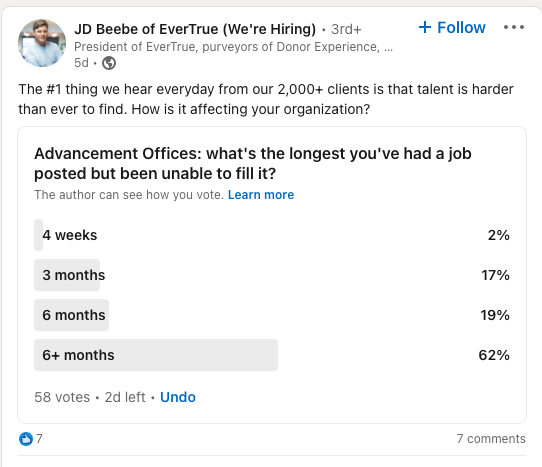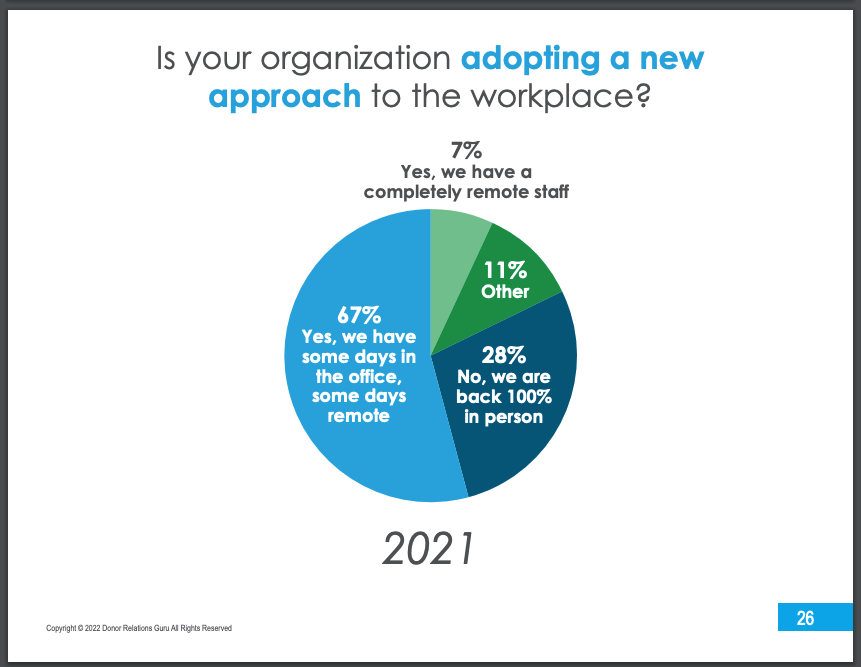We hear it every day from leaders we are talking to in the industry. Hiring and retaining talent is harder than ever. Some even say it’s the one thing that keeps them up at night.
As the Covid pandemic and Great Recession linger (as many as 1 in 5 workers will leave their jobs this year), leadership is left fighting to fill their vacant positions. With competition everywhere you look, you may be tempted to turn to incentives like hiring bonuses to get people in the door. (We talked with one university that experimented with turning a relocation reimbursement into a signing bonus for new hires who accepted a job offer within 24 hours.)

It’s difficult to overlook the urgency of filling vacant roles and focus on those employees who remain constant and committed, but we’re here to tell you that’s the key to a successful shop. We all know it’s cheaper and more efficient to retain good employees than to hire new ones. The median cost to replace a gift officer is $20k, nevermind the opportunity cost of lost pipeline. So, the question you should be asking is how do we invest in and retain our top talent?
We’ve talked to a few advancement shops to get their take on how they are investing in their people and reducing turnover.
People as your top priority
Sure, paying your employees fair, above-market salaries will already get you a step ahead. What really makes a difference, though, is building a culture that puts the people first. Here are a few steps to help you get on the right track:
- Assess your current culture. Make sure your policies and processes are people focused and not pushing good talent out the door. This also includes good onboarding procedures which can mean employees are 60% more likely to stay for three or more years and increases productivity by 25%. Here’s a great checklist for onboarding your team.
- Think about what employees value most today — time, family, health, professional growth, and environment over money and title. If you don’t already, incorporate benefits into your overall compensation plan that show your employees that you value their time, health, and life outside of the office. Here are a few research-backed reasons why gift officers stay in their roles.
Hybrid or remote-first work structure
The return to fully in-office structures is one of the most common reasons many employees are leaving their positions post-pandemic. It’s no surprise that after experiencing the flexibility and freedom that come along with remote work, people are hesitant to return to their offices. No commute, flexible work hours, and more time with family have all made life and schedules more manageable, affordable, and enjoyable. The statistics say it all. When people have the chance to work flexibly, 87% of them take it.
What does this look like? It can look like many things, but the important thing is to involve your employees from the start to get their buy-in and give them a chance to help build their own company culture. This can be done through a survey or individually during 1:1s. Give them some options around what days would be in office and remote and find out what best fits for your shop.
Matthew Ewing, Vice President for University Advancement at Boise State, shared an example of what works for his team. They have a 3 days in-office and 2 days remote work structure. This hybrid structure allows for more flexibility while still providing in-office days for important face-to-face meetings and interactions.
We’ve begun to see more and more institutions adding or expanding remote-first or hybrid positions, like the teams at University of New Hampshire and Emory. It’s a step in the right direction to help fill industry shops with top talent.

Incentive compensation
Drop these two words at a CASE conference, and people just might lose their minds. But don’t get too caught up in whatever previous thoughts or experiences you may have with this type of compensation.
We’re talking about incentivized compensation for performance. And this has to be carefully thought out. What does performance mean to you and your team? Similar to implementing a hybrid work structure, remember to gain trust and buy-in from the people who will live under this new structure and involve them from the beginning. This is a nuanced process and the rhetoric is important.
In order to be competitive in this landscape, we want to reward the good work of our teams. John Small, Senior Associate Vice President of Development at University of Wyoming, is doing this exact thing with his Donor Experience Officers. Performance-based incentive compensation around activity. John shared that compensation should depend on things his employees can control, not intangibles, which is why the goals should be activity based and not based on dollars raised. Additionally, their compensation isn’t just a one-time bonus. Their incentive compensation is essentially a raise because if they meet their performance goals they then receive that amount added to their salary. It’s ingenious!
John Small, Senior Associate Vice President of Development, University of Wyoming
Ultimately, there are a wide variety of ways you and your team can think about investing in your people. The more your policies and processes invest in your people, the happier they are and the longer they’ll stick around. People first, always.
Want further listening around hiring and retaining top advancement talent? Check out these great episodes of the RAISE podcast on ETSPN:
Retention by focusing on the Three P’s with Dori Sonntag, Gonzaga University
How to diversify our teams through recruitment with Mike Bacon, Trinity University
Importance of trusting your people with Jonathan Purvis, Butler University
The power of inclusive mentorship with Amy Yancey at Boston College
Tenure vs. Turnover with Todd McCubbin, University of Missouri
